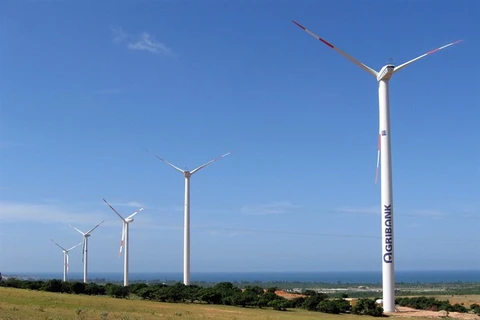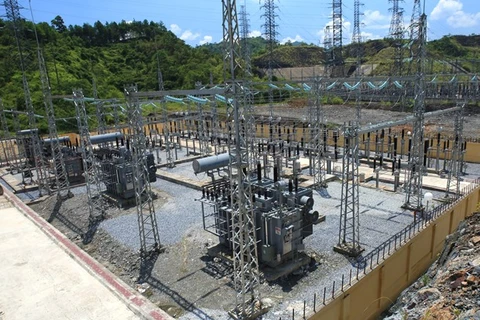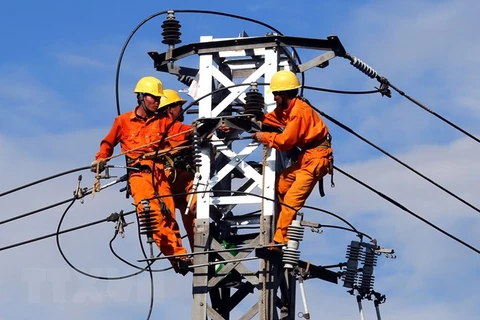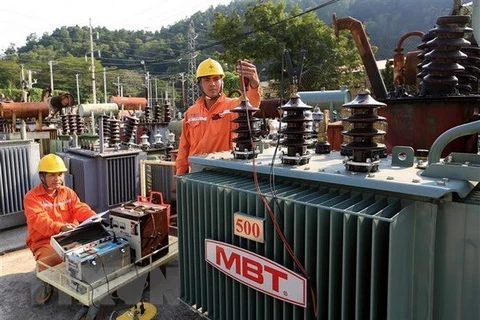Hanoi (VNS/VNA) - Power prices will increase by an average of 8.36 percent at the end of this month, said Deputy Minister of Industry and Trade Hoang Quoc Vuong on March 5.
Accordingly, the retail electricity price will be adjusted from the current 1,720 VND (7 US cents) per kWh to 1,864 VND per kWh (8 cents) excluding value-added tax.
Vuong said the power price rise was one solution to improve the finances of the electricity sector.
Electricity prices have been adjusted seven times since 2010. The latest adjustment was at the end of 2017.
According to Decision 24 issued by the Prime Minister, there was supposed to be an adjustment in 2018. However, prices were kept unchanged in order to stabilise the macro-economy despite the fact that increasing costs have greatly affected the power sector, he said.
He added that a price hike could not be delayed any longer.
The deputy minister said the Electricity of Vietnam (EVN) reviewed every expense and input factor that affects power prices. The PM also gave permission to raise electricity prices in the first quarter of this year.
He said the power price adjustment would have effects on GDP and CPI. According to calculations by the ministry and General Statistics Office, the hike would reduce GDP by 0.22 percent and increase CPI by 0.29 percent.
He noted that the Government’s targets this year were to stabilise the macro-economy and curb inflation to achieve a GDP growth rate of more than 6.8 percent. The power price adjustment was calculated to meet the targets approved by the National Assembly.
A detailed announcement on power prices will be released by next week, he said.
The Government stipulated that a below-10 percent increase in electricity price comes within the jurisdiction of the Ministry of Industry and Trade (MoIT) after receiving the Prime Minister’s permission.
According to the MoIT, the country’s electricity price was more than 7 cents before adjustment. Meanwhile, power prices in India and China stand at 8 cents, Laos at 9 cents, Indonesia at 10 cents and Canada at 11 cents.
In January, Deputy Prime Minister Vuong Dinh Hue asked ministries to make input factors more transparent. For example, the power price adjustment must be calculated with the prices of gas and coal sold for electricity production as well as foreign exchange rates.
The power price adjustment must attract energy investors and cover costs for production and consumption. The electricity sector must reduce production costs with a suitable labour structure and the application of technology, Hue said.
Earlier, the ministry issued Decision No 281 which increases the prices for power generation in 2019.
Accordingly, the prices for power generation at coal-fired power plants are set to range between 1,677 VND and 1,896 VND per kWh during 2019, excluding some taxes, sea port fees and infrastructure. The ceiling prices for power generation at hydropower plants this year would increase by 20 VND per kWh to reach 1,100 VND per kWh, excluding taxes.
These prices are used to negotiate power purchase agreements between the State-run EVN and power plants.-VNS/VNA
Accordingly, the retail electricity price will be adjusted from the current 1,720 VND (7 US cents) per kWh to 1,864 VND per kWh (8 cents) excluding value-added tax.
Vuong said the power price rise was one solution to improve the finances of the electricity sector.
Electricity prices have been adjusted seven times since 2010. The latest adjustment was at the end of 2017.
According to Decision 24 issued by the Prime Minister, there was supposed to be an adjustment in 2018. However, prices were kept unchanged in order to stabilise the macro-economy despite the fact that increasing costs have greatly affected the power sector, he said.
He added that a price hike could not be delayed any longer.
The deputy minister said the Electricity of Vietnam (EVN) reviewed every expense and input factor that affects power prices. The PM also gave permission to raise electricity prices in the first quarter of this year.
He said the power price adjustment would have effects on GDP and CPI. According to calculations by the ministry and General Statistics Office, the hike would reduce GDP by 0.22 percent and increase CPI by 0.29 percent.
He noted that the Government’s targets this year were to stabilise the macro-economy and curb inflation to achieve a GDP growth rate of more than 6.8 percent. The power price adjustment was calculated to meet the targets approved by the National Assembly.
A detailed announcement on power prices will be released by next week, he said.
The Government stipulated that a below-10 percent increase in electricity price comes within the jurisdiction of the Ministry of Industry and Trade (MoIT) after receiving the Prime Minister’s permission.
According to the MoIT, the country’s electricity price was more than 7 cents before adjustment. Meanwhile, power prices in India and China stand at 8 cents, Laos at 9 cents, Indonesia at 10 cents and Canada at 11 cents.
In January, Deputy Prime Minister Vuong Dinh Hue asked ministries to make input factors more transparent. For example, the power price adjustment must be calculated with the prices of gas and coal sold for electricity production as well as foreign exchange rates.
The power price adjustment must attract energy investors and cover costs for production and consumption. The electricity sector must reduce production costs with a suitable labour structure and the application of technology, Hue said.
Earlier, the ministry issued Decision No 281 which increases the prices for power generation in 2019.
Accordingly, the prices for power generation at coal-fired power plants are set to range between 1,677 VND and 1,896 VND per kWh during 2019, excluding some taxes, sea port fees and infrastructure. The ceiling prices for power generation at hydropower plants this year would increase by 20 VND per kWh to reach 1,100 VND per kWh, excluding taxes.
These prices are used to negotiate power purchase agreements between the State-run EVN and power plants.-VNS/VNA
VNA
























